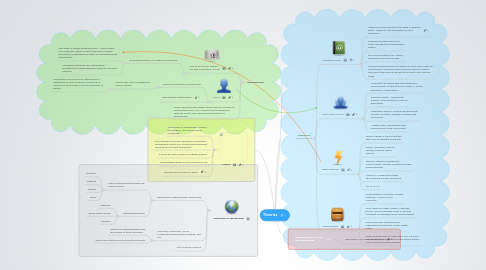
1. TECHNOLOGY
1.1. MEDIA ECOLOGY (Media Ecology Association, 2009)
1.1.1. no single definition, no coherent framework
1.1.1.1. "the study of media as environment" - Lance Strate /Neil Postman-"study of how media affect human perception, understanding, value, and feeling through the machine"
1.1.1.2. compound discipline like mathematical biochemistry/"preparadigmatic science"-Christine Nystrom
1.2. SCOT
1.2.1. Social Construction of Technology
1.2.1.1. Technology does not determine human actions
1.2.1.1.1. acceptance and rejection of technology is dependent on human beings so failure and success of technology is also on the hands of human.
1.2.2. Technological Determinism
1.3. While Media Ecology studies about affects of meida on human behaviours, SCOT argues human beings are dominat factors who decide the application of techonology
2. TPACK
2.1. Three types of Knowledge: Content, Pedagogical, and Technological Knowledge.
2.2. For a teacher to be well equipped for effective pedagogical practice in a technology enhanced learning environment (Wikipedia).
2.3. in 2006 by Punya Mishra & Matthew Koehler
2.4. Its framework builds on Lee Shulman's PCK
2.5. youtube link to TPACK in 3mns
3. Philosophy of Teachnology
3.1. Philosophy of Teaching with Technology
3.1.1. Actual writing practice hidden by casual writing
3.1.1.1. blogging
3.1.1.2. chatting
3.1.1.3. texting
3.1.1.4. email
3.1.2. Getting/asking help
3.1.2.1. database
3.1.2.2. asking friends online
3.1.2.3. research
3.2. Learning in classroom, online, professional development program, and etc
3.2.1. sharing and gathering ideas and philosophy of other educators
3.2.2. sharing tips and tools of teaching technology
3.3. 21st Centuray Literacy
4. LEARNING
4.1. CONNECTIVISM
4.1.1. "Pipes are more important than what is inside of pipes" -where to find information is more important. "
4.1.2. Learning for digital age since 2006: George Siemens&Stephen Downs
4.1.3. any communication tool; twitter, facebook & any web storage
4.1.4. Assuming everyone has a facebook account, let's create an open(public) classroom group and post ideas on today's learning so that anyone can get an access to our learning today.
4.2. CONSTRUCTIVISM
4.2.1. Learning(L) by interacting with others and environments: problem/project based L, Active, discovery, collaborative L.
4.2.2. Seymour Papert- "Learning by making" more focuses on real life application
4.2.3. Vygotsky's Zone of Proximal Development; teacher-facilitator, students centred with scaffolding
4.2.4. Create a story, which deals with cyberbullying using GoAnimate.
4.3. BEHAVIORISM
4.3.1. What is shown is more important than inner knowledge-black box.
4.3.2. Pavlov, Thorndike, Watson, Skinner "Practice makes Perfect"
4.3.3. stimulus, rewards, punishment, reinforcement; operant conditioning: task based learnings
4.3.4. Use your i-Clicker and answer the following multiple questions.
4.3.5. +R -P +P -R
4.4. COGNITIVISM
4.4.1. Computational: encoding, storage, retrievals-""The mind is a computer"
4.4.2. since 1990s by Piaget, Gagne, Vygotsky, Bruner. "Prior knowledge is key in learning (Schema)" Knowledge based learning theory
4.4.3. How knowledge appears and is organized are important; Pretzi, Digital maps
4.4.4. What is cyberbulying? Please post your previous knowledge on cyberbullying under each question in the class 101 facebook group.
